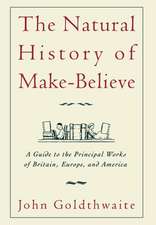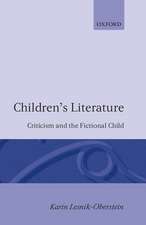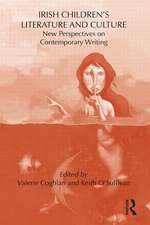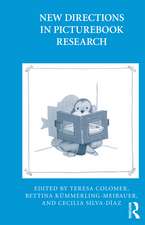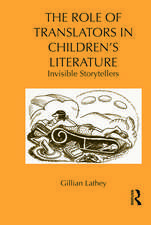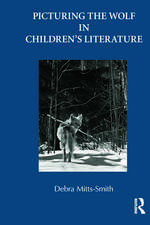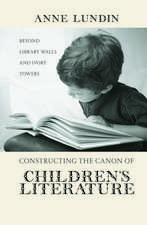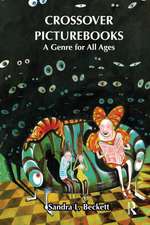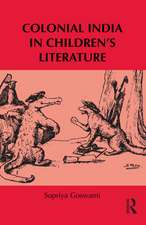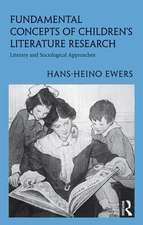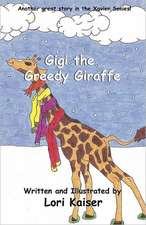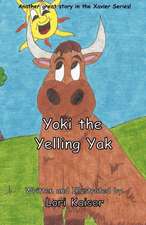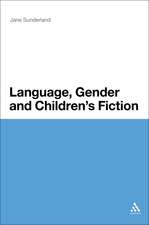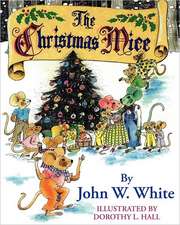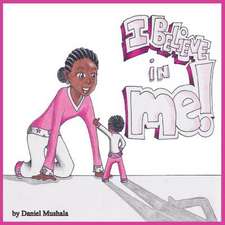Human Rights in Children's Literature: Imagination and the Narrative of Law
Autor Jonathan Todres, Sarah Higinbothamen Limba Engleză Paperback – 4 aug 2016
| Toate formatele și edițiile | Preț | Express |
|---|---|---|
| Paperback (1) | 337.52 lei 11-16 zile | |
| Oxford University Press – 4 aug 2016 | 337.52 lei 11-16 zile | |
| Hardback (1) | 599.66 lei 32-37 zile | |
| Oxford University Press – 28 ian 2016 | 599.66 lei 32-37 zile |
Preț: 337.52 lei
Preț vechi: 383.02 lei
-12% Nou
Puncte Express: 506
Preț estimativ în valută:
64.59€ • 67.91$ • 53.37£
64.59€ • 67.91$ • 53.37£
Carte disponibilă
Livrare economică 17-22 martie
Preluare comenzi: 021 569.72.76
Specificații
ISBN-13: 9780190493189
ISBN-10: 0190493186
Pagini: 320
Dimensiuni: 155 x 234 x 20 mm
Greutate: 0.45 kg
Editura: Oxford University Press
Colecția OUP USA
Locul publicării:New York, United States
ISBN-10: 0190493186
Pagini: 320
Dimensiuni: 155 x 234 x 20 mm
Greutate: 0.45 kg
Editura: Oxford University Press
Colecția OUP USA
Locul publicării:New York, United States
Recenzii
The authors analyze and discuss children's books that exemplify the rights and ideas covered within that area of international law, as well as reader responses from children engaged with those same fictional texts. The result is a book that is complex, informative, and multifaceted... The selected results of this qualitative study help bolster the authors' claims that children's literature can and does affect the perception of human rights among young readers while supporting the idea that the study of children's literature is valid and important in this context.
For those working to bring human rights home, the book offers important and unique insights on the role that childrens literature can play in shaping a culture of human rights, near and far.
The authors have embarked upon a unique and thought-provoking exploration of childrens literature through which readers gain new insights into how stories influence childrens awareness of their rights. This groundbreaking inquiry is a must read for all those interested in learning how literature serves as a vehicle for human rights education.
Jonathan Todres and Sarah Higinbotham reveal in this remarkable and long overdue book [that] the content of children's literature is crucial. It matters for the children concerned and, by extension, for the very nature of the societies in which they grow up. It helps children to understand that they have rights, and that these rights are important. Children's literature has a pivotal role to play in forging that early sense of self-worth, and Jonathan and Sarah are to be congratulated for shining a new light on a role that has, until now, been under-appreciated". (From the Foreword) -Carol Bellamy, Former Executive Director of UNICEF
Human Rights in Children's Literature is an important book for educators and anyone who believes that society is better off when everyone knows their rights and then adults are expected to talk about and teach rights to the next generation. This original inquiry combines children's rights, human rights, and literary theory with the larger purpose of finding better ways to teach human- and children's- rights in a timely manner to young people. The authors are interested in advancing children's rights by striving to enforce an under-appreciated principle in the United Nations Convention on the Rights of the Child - a requirement that people (children and adults alike) be informed of their rights. Instead of focusing on what rights children have or ought to have, this books asks us to consider why it is important to teach young people what are their rights. This could transform society, leading to citizens expecting and demanding that their rights be honored." -Martin Guggenheim, NYU Law
The relationship between human rights and children's literature is of the utmost importance to all those with an interest in either. Human Rights in Children's Literature is the first book to comprehensively reflect on the influence and interpenetration of the discourse of rights and the experience of literature in the moral development of children. The authors reveal a powerful sensitivity to the deep emotional undertow that the books we read in childhood instil in us and exert over us all of our lives. At the same time they demonstrate a sophisticated understanding not only of the theoretical and legal framework of human rights, but of the actual experiences of vulnerable children around the world. Those children, and our own, deserve no less." -Professor Desmond Manderson, Australian National University
In this wonderful and wonder-filled book, two gifted scholars take the abstract concept of rights for children and bring it to life through the books children love. It is much more than a scholarly study. It is a roadmap for action. Not your grandmother's two dimensional paper roadmap, but a 21st century navigator speaking in voices that are funny, frightened, angry, sad, brave, and joyful to guide us on the path to implementation of children's rights as human rights." -Barbara Bennett Woodhouse, L. Q. C. Lamar Professor of Law, Director Child Rights Project, Emory University School of Law
One of its strengths is that it does not merely depend on adults' analyses of key works of children's literature, but it also incorporates responses from child readers themselves. As the authors explain, they 'designed a qualitative, descriptive study' that involved their facilitation of reading groups comprised of 'children as young as four years old and as old as seventeen in their natural settings (schools and after-school programs)'; in turn, they drew on the participants' insights, anecdotes and questions as they considered how 'children's books allow children to think about human rights in ways that are developmentally suitable and profoundly imaginative'.s
For those working to bring human rights home, the book offers important and unique insights on the role that childrens literature can play in shaping a culture of human rights, near and far.
The authors have embarked upon a unique and thought-provoking exploration of childrens literature through which readers gain new insights into how stories influence childrens awareness of their rights. This groundbreaking inquiry is a must read for all those interested in learning how literature serves as a vehicle for human rights education.
Jonathan Todres and Sarah Higinbotham reveal in this remarkable and long overdue book [that] the content of children's literature is crucial. It matters for the children concerned and, by extension, for the very nature of the societies in which they grow up. It helps children to understand that they have rights, and that these rights are important. Children's literature has a pivotal role to play in forging that early sense of self-worth, and Jonathan and Sarah are to be congratulated for shining a new light on a role that has, until now, been under-appreciated". (From the Foreword) -Carol Bellamy, Former Executive Director of UNICEF
Human Rights in Children's Literature is an important book for educators and anyone who believes that society is better off when everyone knows their rights and then adults are expected to talk about and teach rights to the next generation. This original inquiry combines children's rights, human rights, and literary theory with the larger purpose of finding better ways to teach human- and children's- rights in a timely manner to young people. The authors are interested in advancing children's rights by striving to enforce an under-appreciated principle in the United Nations Convention on the Rights of the Child - a requirement that people (children and adults alike) be informed of their rights. Instead of focusing on what rights children have or ought to have, this books asks us to consider why it is important to teach young people what are their rights. This could transform society, leading to citizens expecting and demanding that their rights be honored." -Martin Guggenheim, NYU Law
The relationship between human rights and children's literature is of the utmost importance to all those with an interest in either. Human Rights in Children's Literature is the first book to comprehensively reflect on the influence and interpenetration of the discourse of rights and the experience of literature in the moral development of children. The authors reveal a powerful sensitivity to the deep emotional undertow that the books we read in childhood instil in us and exert over us all of our lives. At the same time they demonstrate a sophisticated understanding not only of the theoretical and legal framework of human rights, but of the actual experiences of vulnerable children around the world. Those children, and our own, deserve no less." -Professor Desmond Manderson, Australian National University
In this wonderful and wonder-filled book, two gifted scholars take the abstract concept of rights for children and bring it to life through the books children love. It is much more than a scholarly study. It is a roadmap for action. Not your grandmother's two dimensional paper roadmap, but a 21st century navigator speaking in voices that are funny, frightened, angry, sad, brave, and joyful to guide us on the path to implementation of children's rights as human rights." -Barbara Bennett Woodhouse, L. Q. C. Lamar Professor of Law, Director Child Rights Project, Emory University School of Law
One of its strengths is that it does not merely depend on adults' analyses of key works of children's literature, but it also incorporates responses from child readers themselves. As the authors explain, they 'designed a qualitative, descriptive study' that involved their facilitation of reading groups comprised of 'children as young as four years old and as old as seventeen in their natural settings (schools and after-school programs)'; in turn, they drew on the participants' insights, anecdotes and questions as they considered how 'children's books allow children to think about human rights in ways that are developmentally suitable and profoundly imaginative'.s
Notă biografică
Jonathan Todres is a Professor of Law at Georgia State University College of Law. His research focuses on children's rights and child well-being. Professor Todres has published more than fifty articles on children's rights, child trafficking and related forms of exploitation, legal and cultural constructs of childhood, and human rights in children's literature. He is a fellow of the American Bar Foundation.Sarah Higinbotham is a Marion L. Brittain Postdoctoral Fellow at the Georgia Institute of Technology. Her scholarship centers on the intersections of literature and law. She has written about the violence of the law in early modern England, critical prison theory, and human rights in children's literature. She teaches at a men's prison outside Atlanta and works actively with an Atlanta nonprofit that benefits children who have an incarcerated parent.

